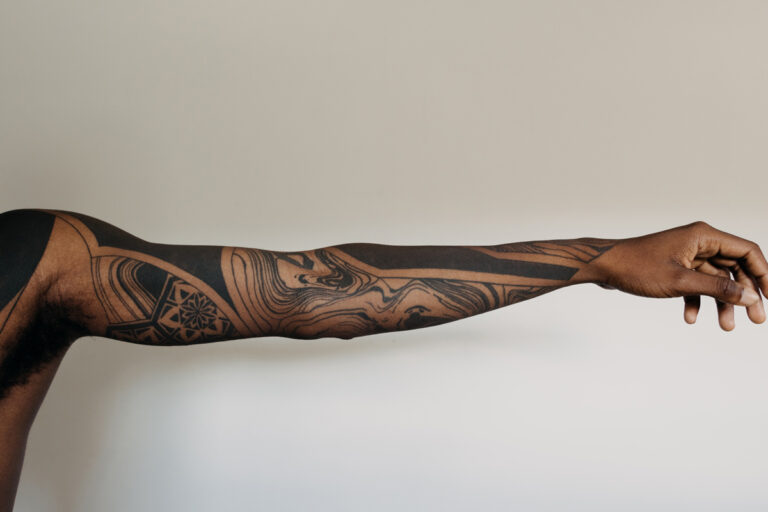What is a blackout tattoo? Here’s why you should think twice before getting one
Whether it’s an ‘ITS COMING HOME’ tattoo plastered on your forearm or a photorealistic tattoo of your ex’s face spread across your chest, we’ve all made mistakes. Nothing can compare to that stomach-drop sensation: the sobering realisation of what you’ve done to your skin, scrabbling for the number of your local tattoo removal clinic. What if, instead of lasering the ink off, you just cover the piece with even more ink?
Although cover-ups aren’t the only reason people opt for getting a blackout tattoo, they make up a significant portion of people who have them. However, although it might seem like the easy option, there are reasons why you should think twice before committing to one.
What is a blackout tattoo?
A blackout tattoo essentially speaks for itself: a form of tattooing which typically covers a section of the body—often the arms or legs—in solid, opaque black ink. The design is deliberately bold, leaving a large chunk of the body in nothing but black ink. Think of it as using the fill paint bucket on MS paint, but instead of filling in a square, you’re filling in a section of your body.
Opting for a blackout tattoo comes with its fair share of costs (and pain). Often, committing to a blackout tattoo session can be time-consuming—the larger the area being tattooed, the more sittings and needles are needed. Also, as blackout tattoos are designed to be completely solid, a tattoo artist would most likely have to go over spots multiple times to ensure an even pigment distribution. If your artist makes a mistake and misses the smallest section of skin it’ll throw off the aesthetic of your entire tattoo. No pressure…
So, if you are set on getting a blackout piece, best choose a reliable and experienced tattooist for the job. According to BYRDIE, you should expect to pay between $100 to $300 per hour (that’s around £70 to £115) for a blackwork piece to be done. That adds up when you take into account that blackout tattooing often takes multiple hours to complete (depending on the size of the piece you’ve requested).
Why you should think twice...
Okay, so you’ve come to terms with the reality a blackout tattoo will have on both your pain receptors and your wallet—but what about the social and cultural implications? While the idea of a blackwork tattoo being offensive is very much up for debate, many believe the practice is a form of cultural appropriation.
Consider this: a white man pays money to darken his skin for social gain (to look cool to his friends, to get more matches, for Instagram clout… whatever the reason). According to the cultural theorist George Lipsitz, this is textbook cultural appropriation: “When an element of culture is adopted from a marginalised group without respect for its cultural meaning or significance or within the purpose of exploiting the culture for economic or social gain.”
Tattoo artist Elisheba Mrozik also believes blackout tattoos can be a form of cultural appropriation. She told BYRDIE, “It is also [insensitive] to think that blacking out your skin as a white person is a ‘trendy’ thing when, for centuries, being dark-skinned in this nation has been a curse and cause for pain, strife, economic slavery and injustice, stolen wealth and legacies, ruinous incarceration rates, violent death, and dreams deferred.”
It’s hard to ignore the fact that choosing to darken a large section of your skin as a non-black person could be problematic. People of colour face daily discrimination because of their complexion. Even unknowingly, by choosing to get a blackout tattoo you could be maintaining and reinforcing that institutional racism. As Mrozik highlights, “Ignorance of something does not excuse people from its consequences.”






